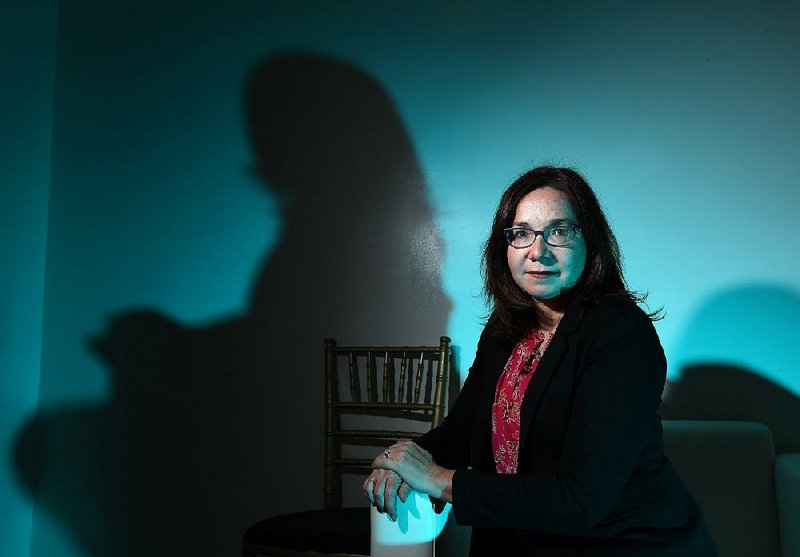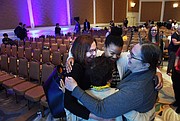WASHINGTON -- In the beginning, God created the heavens and the Earth, and the Earth was shapeless and barren, so God added light and water and land and sky and plants and animals and humans. If you extend this belief forward, then God also created coal and oil and gas, which we began burning to do our own creating, on a large scale. Health and wealth flowered across the planet, but there were consequences: first for the poor and marginalized, who were more exposed to the pollution, and then for everyone, in the form of a changing climate that is endangering creation. Stretch the belief a bit further, and in 1972, God created Katharine Hayhoe, who would grow up to be an evangelical Christian and a climate scientist. Join these identities together, and you get another of God's creations: a prophet.
And on a Monday morning last month, the prophet performed a miracle: She got a ballroom of climate activists to applaud fossil fuels.
"What was life like before the Industrial Revolution?" Hayhoe asked during a keynote address at the Citizens' Climate Lobby conference in Washington. "It was short. It was brutal."
A woman's work was an endless cycle of drudgery.
Economies were built on the backs of children and slaves.
"So I realized that I am truly and profoundly grateful for the benefits and the blessings that fossil fuels have brought us."
And then her audience of 1,500 began to clap. They were clapping for fossil fuels because it was cathartic to acknowledge that, for all the damage done, coal and gas and oil had been gifts to mankind. And they were clapping for Hayhoe, whose tribute to energy was part of a story she told about establishing a rapport with employees of an oil-and-gas company in Texas.
Hayhoe knows how to speak to oil men, to Christians, to farmers and ranchers, having lived for years in Lubbock, Texas, with her pastor husband. She is a scientist who thinks that we've talked enough about science, that we need to talk more about matters of the heart.
TALKING ABOUT FAITH
For her, that means talking about faith.
"We humans have been given responsibility for every living thing on this planet, which includes each other," Hayhoe said at the conference. "We are called to tend the garden and be good stewards of the gifts that God has given us."
You might say that the climate problem, while understood through science, can be solved only through faith.
Faith in each other.
Faith in our ability to do something bold, together.
Faith that the pain of change, that the sacrifices required, will lead to a promised land.
Does this sound believable? Maybe in some places, to certain people. In Washington, at the climate conference, Hayhoe was preaching to the choir. But the prophet wasn't just in town to talk to believers. She was here to talk to Congress.
Getting activists to clap for fossil fuels was the easy part.
"People sometimes call me a climate evangelist, and I'm like, 'No, this is not Good News.'"
Hayhoe was at lunch, after her keynote at the conference.
"I'm not an evangelist," she continued.
"We are warning people of the consequences of their choices, and that's what prophets did," she said.
"A prophet is not valued in their hometown," said her lunch date, Jessica Moerman, paraphrasing the Gospels. Moerman, 33, is a fellow member of a tiny club: Christian climate scientists married to evangelical ministers.
"No, they're not," Hayhoe said, laughing. She gets a steady stream of hate on social media and the occasional death threat. But she reminds herself that hate comes from anger, and anger comes from fear -- and fear does not come from God, according to the Apostle Paul in his letter to Timothy.
"What is from God is the rest of the verse: a spirit of power," Hayhoe said, referring to Paul's letter. "Power is empowerment. The ability to act."
BOOKED MONTHS AHEAD
Hayhoe is a director of the Climate Science Center at Texas Tech University in Lubbock where she is a congregant in her husband's nondenominational Church Without Religion. Her schedule is booked months ahead with appearances in classrooms, churches, TV studios and at conservative colleges where she has been accused of "spreading Satan's lies." Moerman, who lives in Washington, is a science and policy fellow for the American Association for the Advancement of Science and a leader at Grace Capital City, where her husband is the founding pastor.
Hayhoe started in astrophysics, looking up into the beyond. Moerman first trained in geology, looking down into our past. In each direction, they found divinity revealed by data.
In climate science, they followed a calling to understand our place in creation, and in the Bible, they derive guidance on what to do with that understanding.
"Science does have its limits," Moerman said. "The scientific method is very powerful and has led us to major discoveries, but it has boundaries. Science doesn't have all the answers of, say, what to do about it. Science answers questions of what, how --"
"Where, when," Hayhoe added. "Yes."
"But when it comes to what should we do --"
"Why."
"And why."
"Yes. It doesn't answer those."
MELTING PERMAFROST
In the beginning -- if recent history is our beginning -- climate change began to make winters milder and heat waves more frequent. In the east, it made storms wetter; in the west, it made droughts drier. Human infrastructure was strained by melting permafrost in Alaska and larger wildfires in California. It was happening now, and not enough people understood, or believed, that they had a role to play in what could happen next.
This was the essence of Katharine Hayhoe's written testimony to Congress, where she appeared the morning after her keynote.
"The question of which scenario is more likely is not one that science can answer," Hayhoe wrote to the House Budget Committee, for its hearing on the costs of climate change. "Instead, the answer is up to us."
It was Hayhoe's first time testifying before a congressional committee. She had prayed for wisdom. How should she condense her letter -- and our entire quandary -- into a five-minute opening statement?
"We are conducting an unprecedented experiment with the only planet we have," she told the men, later stressing a word that might have value to a member of the Budget Committee. "We are not adapting fast enough, and the further and faster the climate changes, the more difficult and expensive ..." -- she let the financial prophecy hang for a moment -- "... it may be to do so."
About 42 minutes in, Rep. Scott Peters, D-Calif., asked for Hayhoe's side as about how Democrats could engage people on a plane beyond politics.
"We all care about our families," Hayhoe replied. "We care about our communities. We care about people who are suffering today -- poverty, hunger and more. And those are the exact values we need to care about a changing climate."
SETTING AN EXAMPLE
Republicans outnumbered Democrats at this hearing, and Hayhoe could feel the air shift when she talked about Texas and her faith. Rep. Tim Burchett, R-Tenn., thanked her for setting an example of environmental stewardship.
"I think God has given us some great solutions" on climate, he said. "I just think we've turned our back on Him, in more ways than one. And we're not looking at what's going on around us." Burchett was barely six months into his first term, but his frustration with Congress was clear. He saw in Hayhoe an exemplar but then looked past her at the crowd standing in the back of the hearing room. They were young. Many of them had been at the Citizens' Climate Lobby conference.
"We're not gonna do a dadgum thing up here," Burchett said to them. "You all are going to have to do it."
His words struck a 23-year-old from Philadelphia who was leaning against the wall. Gabrielle Swain wrote about the climate's effect on marine life for her undergraduate thesis and plans to pursue a PhD in biology. As a practicing Catholic, Swain had been awed by Hayhoe's keynote the day before.
There was a Christian climate scientist, speaking Swain's language, using a dark prophecy to shine light.
And now here was a congressman from Tennessee, affirming that the power to act was hers.
The messages were coming through loud and clear.
Religion on 07/27/2019

